Volunteer Discovers Her “Inner Teacher” Inside Greek Classroom
Volunteers often discover that, despite their professional background, they can be significant resources in a classroom. Such is the case with business owner and volunteer, Jennifer, who says she was surprised how comfortable she became working with second- and third-grade students. Read on for more insights:
by Jennifer M., Greece Global Volunteer.
My teammates from week one having moved on, I prepared for the second week of summer English school in Gazi. Although I was a little daunted by this idea, and missed the company and conversation with my previous teammates, Sam (the Greece Team Leader and Country Manager) and her family restructured the program and classrooms for the second week to facilitate a successful experience for everyone. I was grateful, and transitioned into the new week pretty seamlessly.
There were some great highlights from my second week in the classroom, as well as moments where I thought “good grief, what have I gotten myself into?” The volume of voices and noise was often much higher than I would typically prefer. (Explaining your wish for “soft voices” or “please sit down” is complicated when you’re not able to communicate in a common language). I reminded myself regularly of the goals of the program:
- Have fun.
- Spend quality time with the students.
- Make it a positive experience for everyone.
In this summer school there are no exams, no hard and fast curriculum, and the possibilities are only limited by my own creativity. And the classroom interpreter was my lifeline!!! (Thank you Millie, Sam, and Gabriella!)
For the relatively short amount of time that I spent here, I felt there was some impressive effort and progress on everyone’s part. I so appreciated when the kids learned to say “Good mor-r-r-r-rning Miss Jennifer, ” sung with their characteristic tongue roll when they entered the room each morning. It was rewarding that even the most quiet, reserved students stretched themselves to say the words they remembered whenever I asked; even though some would only whisper, and only if standing right next to me.
Our daily yoga and qi gong session became more smooth and meditative as the week went on. The kids were eager to demonstrate that they could stand on one leg in tree or airplane pose, and they rocked the house with their “Ooooooohhhmmmm’s”! I loved how they would compete to be seen and heard, in their own unique ways – some by quietly making sure that they caught my eye, while others were very assertive in calling out for my attention. Bless their hearts. Children, be seen and be heard. Settle for nothing less. The world desperately needs your pure hearts, your ideas, and your unique contributions!
I totally cracked up and had a ball learning some Greek words. I guess the kids thought it was only fair. As I quizzed them with English flashcards, I asked them to tell me the Greek word as well as the English word. I often had them pronounce the word, slowly, several times to assure that they had it. They also implored me to enunciate my Greek correctly, and made sure I repeated it until I “got” it. I’d try, “pou – ka – mi – so.” They’d laugh at my feeble attempt, and make me do it again, and again. There were a few children that would stay in the classroom at recess and grab the pointer from my desk; it was now their turn to teach me the lesson and check my learning!
Perhaps one of my most clever brainstorms during the program was to ask one of the most advanced students to lead a lesson for the class. Upon finishing his daily writing assignments (which he did with skill and lightning speed), he would quietly sit in the back of the classroom making origami birds. Lots of them. When I asked him if he could teach the class how to make them, he enthusiastically said “nai” (yes!). He did a brilliant job leading. The kids thoroughly enjoyed the lesson, and had a blast flying their paper birds on strings at recess.
Working one-on-one with one particular student showed me how much our undivided attention can mean to a child, and that each child has their own way of integrating tasks and experiences. I found that patience, flexibility, keen listening and observing, and trusting the kids to show me the way were the best strategies for success in the classroom.
The last day of class we made paper chains. The goal was to loop 30 strips of paper into a chain with a glue stick. Once they looped their circles together they were to bring their finished product to me and count the linked circles in English. I looked around the classroom and observed a few moments of gleeful, giggly harmony as they were completely immersed in the task; thrilled with the colored paper strips, their successful linking and counting, and all of the innovative things they found they could do with their paper chains – they wore them as earrings and necklaces, and swung them in the air, to name a few. The activity was a hit (woohoo!).
Among the many lessons I gleaned from this experience was that of the hula hoops. There were two hula hoops in the classroom that had clearly seen better days. Still, the kids were thrilled to play with them every day, and often needed to be reminded to share them and allow equal time to others. At least every other day the hoops were brought to me for repair. The children and I would repair the hula hoop, yet again, with whatever tape we could get our hands on. They were always proud of their clever repair job, and happy to continue playing. It occurred to me how these hula hoops would have long since been discarded in many communities at home, and another bought to replace it, and then another, and another. All of which would meet eventually in an enormous pile of trash.
For what could be perceived as a lack of material resources, there is certainly no lack of motivation, determination, resilience, kindness, playful spirit, ingenuity, intelligence, or capable hands in this community.
Finally it was an inspiration and a pleasure to watch the Pinakoulaki family in action and in relationship to the children and families of Gazi in the summer English program. Their commitment and joy of serving made my heart swell with admiration. The kids and families are receiving great benefit from this program, from what I could see in my brief time there, and it is because Sam and her girls, Millie, Gabriella, and Alice, who serve as interpreters in the classroom, clearly pour their hearts and resources into all aspects of the program. This is matched by the contributions of the lovely family at Hotel Handakas, who welcome volunteers like family. We were showered with warmth, care and attention, provided home-cooked meals, and were invited to practice our (very basic) Greek conversational skills and engage in hearty Greek traditions. It was a joy and privilege to be a guest at Hotel Handakas. Efcharistó!
As was stated so eloquently by one of my team members “Somehow, in this place where the coffee guy doesn’t drink coffee, the pool guy doesn’t swim (both our sweet Paul), and the teachers don’t speak the kids’ language, we were part of something that works.” The kids got to practice a bit of English, play games, enjoy the company and novelty of foreigners, and earned a lot of stickers. For my part, I learned a bit about Greek and Cretan language and culture, a lot about the power of simply showing up, and received dozens of hugs from little people and our hosts. I returned home with a folder full of decorated paper birds, several hand-drawn pictures the from the kids, a Minoan Snake Goddess, an enormous bottle of home-made Raki, two sets of home-made worry beads, a mug reminding me of the love of Crete, and many more gifts and souvenirs in my memory.
“I found myself in a schoolroom where I could not fail to see and hear things worth seeing and hearing, where I could not help getting my lesson, for my lesson came to me.” – Henry David Thoreau

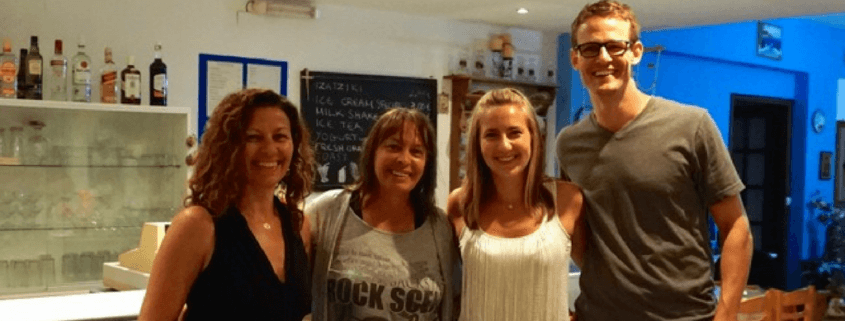
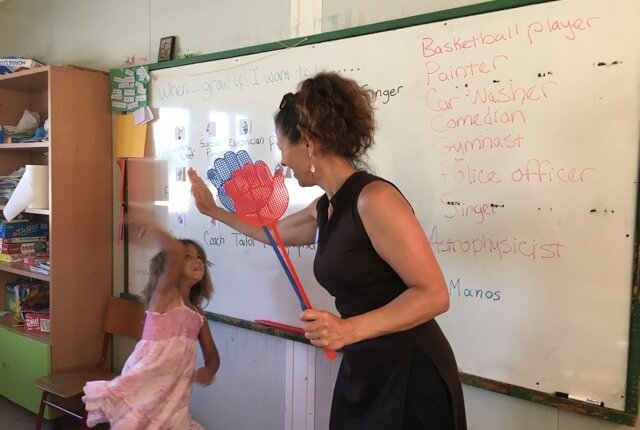
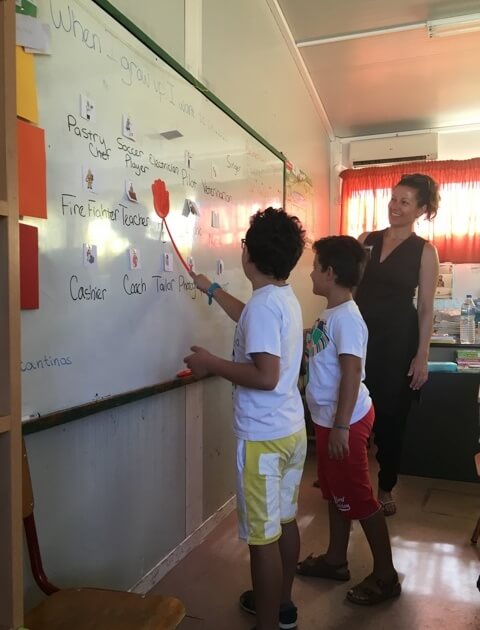
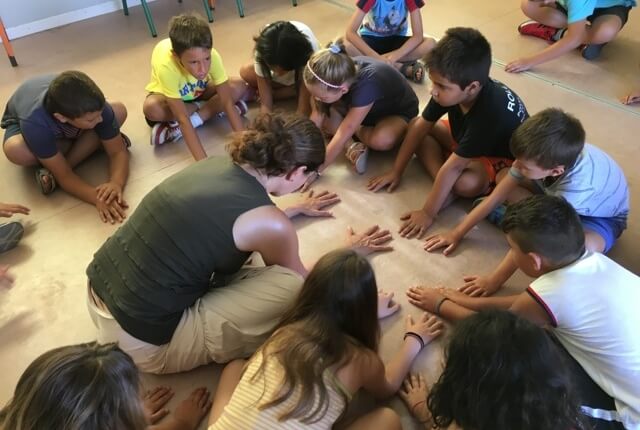
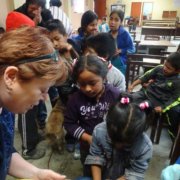

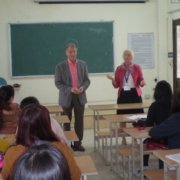
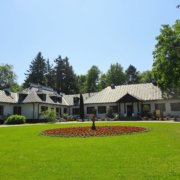
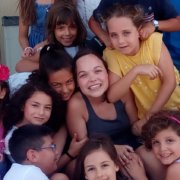
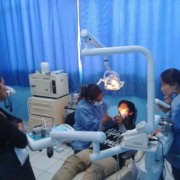
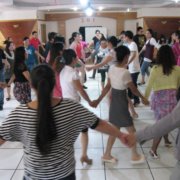


Leave a Reply
Want to join the discussion?Feel free to contribute!